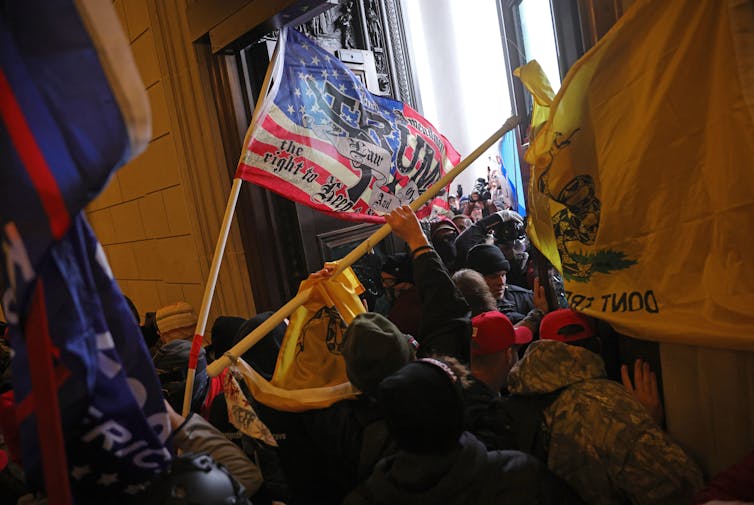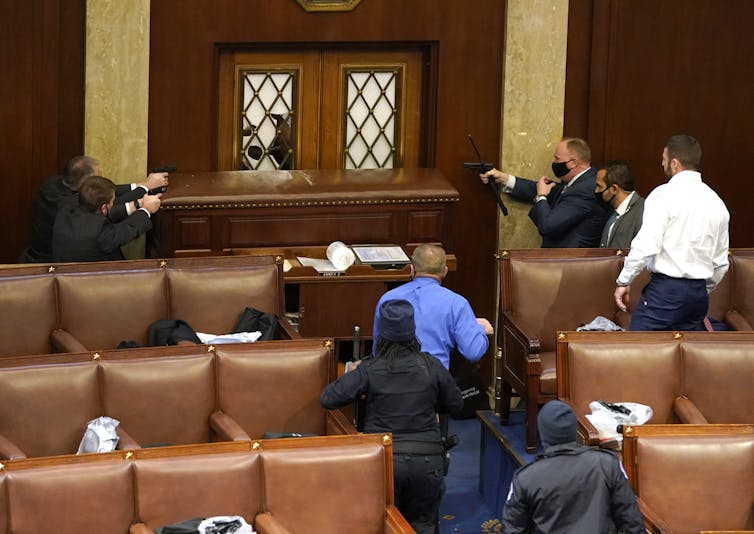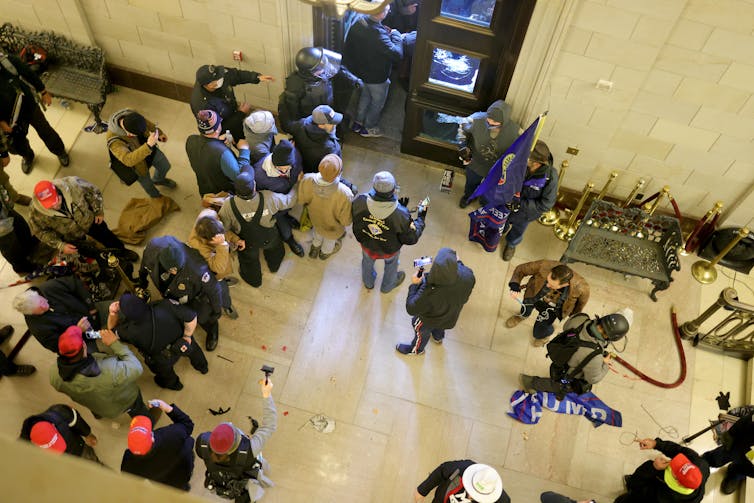
Experts in autocracies have pointed out that it is, unfortunately, easy to slip into normalizing the tyrant, hence it is important to hang on to outrage. These incidents which seem to call for the efforts of the Greek Furies (Erinyes) to come and deal with them will, I hope, help with that. As a reminder, though no one really knows how many there were supposed to be, the three names we have are Alecto, Megaera, and Tisiphone. These roughly translate as “unceasing,” “grudging,” and “vengeful destruction.”
I’ve been doing these for a long time – closing in on five years – and, at least for me, it has not been difficult to hang on to outrage. In fact, I’ve often found it a challenge to hang on to anything else. But, as this article points out, the events of this week have created an environment in which, going forward, it will be at least equally necessary to hold on to our vigilance – to our vision, to or “nose,” to our gut feelings, or however you perceive danger. We are not out of the woods yet.
================================================================
‘Once you engage in political violence, it becomes easier to do it again’ – an expert on political violence reflects on events at the Capitol

Win McNamee/Getty Images News via Getty Images
Naomi Schalit, The Conversation
Editor’s note: Ore Koren is a scholar of civil conflict and political violence. Before the November 2020 election, he wrote a story for The Conversation about the likelihood of election-related violence in the U.S. So we went back to him on Wednesday, while what some are calling an insurrection unfolded at the U.S. Capitol, to ask him for some perspective on the event. This transcript has been edited for length and clarity.
Q: You’re a scholar of political violence. What were you thinking as you watched what’s happened at the U.S. Capitol?
Koren: First of all, I felt pretty stunned. I think that’s a natural response to this. This is a new situation; it shows the power of misinformation and stuff that we’re not really good at dealing with.
My research focuses on organized political violence, which often happens in places where the state does not have much power to prevent violence, where the economy is underdeveloped, where democratic institutions are weak, and where there is a history of organized violence. And usually when we see events at this magnitude, they are accompanied by many casualties, which thankfully was not the case today.
What happened at the Capitol, from what I can tell, was a messy riot where people lashed out at the heart of American democracy, but it remains unclear how organized an effort this was.
Still, it is kind of shocking. We have the biggest economy in the world. Based on what we see in the research, weak economic performance is a strong predictor of organized political violence. The people marching on the Capitol have much more to lose than to gain from this, and to me that’s puzzling.
With an incumbent who has been advocating for a strong law-and-order agenda, many people did not expect this. In a country with a strong domestic security apparatus, militias and vigilantes hurt rather than help in promoting the rule of law.
What separates the U.S. and other advanced and militarily capable democracies from other countries where deadly election violence happens is the ability to wage an effective state response and very quickly implement the rule of law, cracking down on both the perpetrators and any groups they might be affiliated with.
One example of a very effective state response was in Michigan, where the militias plotting to kidnap the state’s governor were quickly apprehended by federal authorities.

Drew Angerer/Getty Images News via Getty Images
Q: How does this compare with political violence in countries you’ve studied?
Koren: Compared to other countries, I’m hoping it won’t get to that threshold of being more extreme. A lot of violence actually happens when a party refuses to give away power or a party blames the other for cheating. Well, that’s kind of what we saw happening here, right, one party was blaming the other for cheating. Only here, we had lots of evidence to the contrary, and we had legal and institutional ways of verifying any cheating or lack thereof.
In the U.S., most of the election challenges happened through formal legal channels. The main problem in places where we see violence happen is because they don’t have these kinds of institutions to deal with this, courts, all those things that our legal system can handle. But in countries where such institutions are weak, the state can’t handle that, and can’t address election challenges through a peaceful process. In this case, we see many political leaders, and not only angry citizens, saying those political institutions are not valid.
Also, in other countries, those engaging in such violence are often pro-government militias, but these are not pro-government militias we’re seeing here; as we saw today, they are actively opposing the police.
Q: But what you’ve got in the U.S. is a group of people who actually don’t believe that those institutions handled this, that it’s all corrupt, that it’s all fake and not real and cheating and plots happened. And we’ve had a president saying that.
Koren: Well, you have the president saying he was cheated, but going through the legal channels. The president didn’t just go and say, “OK, let’s go charge the Capitol,” although Wednesday morning’s speech could definitely be interpreted as instigating something like this. Until now, his rhetoric could be considered more about mobilizing support, and trying to create enough reasonable doubt that could then be used to pressure the results through formal channels.
But we do have a very unpredictable incumbent pushing the legal envelope during the worst pandemic in a century. What we’re seeing today, I think, has a lot more to do with his unpredictability and things we can’t account for in models we use to study political violence events. It’s been more than two months since the election and we didn’t see any serious violence until now, but as the legal options closed, the situation became more problematic. We don’t often see election-related violence months after an election.

Win McNamee/Getty Images News via Getty Images
Q: What do you think this means for the stability of the U.S. government or U.S. elections?
Koren: I’m not an election expert, but it’s a bad precedent. We don’t have a recent history of election violence and, now we can say we do have it, and that’s not a good thing.
What hugely contributed to all of this is misinformation. People mobilized based on a conspiracy with no evidence. I think this is a major problem that has to be addressed – I don’t know how. But it is really crucial to address the underlying problem – that people believe in what they feel is real, not what is real.
Once you engage in political violence, it becomes easier to do it again. But if there’s an effective state response to these events, then it can help strengthen those institutions.
So, I think a lot of people will be saying, look, this is all going to have long-term negative implications. But there’s also a possibility that this can actually help in the long run by showing the grave consequences of manipulating democratic institutions for political gain. Again, it depends on how the state and politicians and security and everybody responds to this. But having a history of political violence is a pretty strong predictor of future violence.
I think it’s really important for federal authorities to show their ability to tackle this. When it comes down to it, the government must show that it can protect American democracy, through force if necessary.
[The Conversation’s most important election and politics headlines, in our Politics Weekly newsletter.]![]()
Naomi Schalit, Senior Editor, Politics + Society, The Conversation
This article is republished from The Conversation under a Creative Commons license. Read the original article.
================================================================
Alecto, Megaera, and Tisiphone, Professor Koren says, “In a country with a strong domestic security apparatus, militias and vigilantes hurt rather than help in promoting the rule of law.” this article does not back that up with evidence, but if someone who has studied this subject as he has says this, you can bet he’s able to back it up. And, if that’s the case, what does that say about the Second Amendment? I do not believe that even the dumbest of out Founders was dumb enough not to realize that as true once there was sufficient evidence.
Interestingly, as you may already have heard from “The Petition Site” (formerly Care2), my old college is doing study on guns and people’s opinions about them. Anyone can participate. Here’s the link.
The Furies and I will be back.
11 Responses to “Everyday Erinyes #248”
Sorry, the comment form is closed at this time.

Great piece, JD!
My reaction was like hers. Initially, I was not angry. I was stunned!
Rather than pro government vs anti government this was pro Democratic Republic vs prp National Socialist Reich.
Trump’s* followers knew exactly what he wanted and did it.
And – I’m sure you’ve seen – Twitter execs are warning they are making plans to do it again on January 17.
Indeed.
Good lord, Happy New Year allofyou folks!!♥️
Scary times with dt doing what he’s saying & doing, and encouraging violence.
I was alarmed at how all this went down too, with the trump mob being so dangerous, imho.
Thanks, Joanne for your post.
thank you…..violence should not be the answer, but when you have no truth, no policies, nothing to unite people…..and you are narissistic and or a megalo-maniac…..
Thanks Joanne. He makes a good case for maximum penalty prosecutions for all involved, congressional sanctions, impeachment and, if cabinet and VP willing to fully honor their oaths to the constitution, Article 25. Since a couple highly photographed turned themselves in, I suspect some still believe they will either have all charges dropped due to their reasons, are brainwashed akin to suicide bombers, or expect a pardon.Also, the news addressing removal of posts, platforms, accounts inciting violence, etc. also mention Jan. 17th as a date also having similar plans, including with state capitols that aligns with the author’s expectation of more violence.
Thanks for another excellent post, Joanne.
There had been quite clear signs of the flames being fanned and of something brewing, including a plan to kidnap a governor and take over a state congress which had been prevented at the last minute, so the attack on the US Capitol didn’t come as much of a surprise to me.
What surprised me most was the sheer incompetence with which this attack was organized. Organizers had taken a leaf out of the book by Dear Leader and never thought things through. Thank goodness for that. Somehow the attackers must have doubted that it would work too.
Professor Koren expects more political violence now that Trumpians had a taste of it. It doesn’t matter that it didn’t work or was badly organised, the mob was never interested in that reality and will continue their attacks based on their alter reality of conspiracy theories. That is why Trump needs to be removed from office before the 20th.
If McConnell doesn’t allow impeachment to come before the Senate, he’ll be equally guilty of inciting any new coup attempt as Trump, Giuliani and Junior are.
This week has been one that will be truly remembered for all of the violence that happened on January 6, all thanks to the flipping bas*ard who’s been taking up space at W,H., not doing anything except preach and show HATRED.
These past four years, he’s gotten away with way too much and it’s finally time he pays up for all of his sins. Plus that goes for all his stinking followers who answered to his call for destruction at the Capital.
I’m praying that they’ll impeach tRump this Monday and that will be the end of tRump ever being involved with politics again.
I also pray that it’s going to be safe Inaugural ceremony for Joe Biden and Kamala Harris, with no tRump supporters doing anything to spoil the special day. I know tRump said he isn’t going to be there, but I don’t trust him one bit. I’m glad he doesn’t have his Social Media to speak to his followers any longer.
Great posts. Thanks Joanne
Haven’t been in touch with you for awhile,I hope that all is well and that you all had a nice Christmas at least!!and a aHappy New Year.🙂
I love “The Conversation,” but missed this piece, so thanks, Joanne.
These fools will be back, I’m sure. They think that Trump is something of a god, if not a definite god-send, and will “know” that the “deep state” is responsible for covering up the huge Trump win, and seating the Biden/Harris team for the International Jewish Communist Conspiracy. That’s what the sign about “The real enemy is Communism” was about. QAnon was there, the “Appeal to Heaven” flag was there, and the myths these things represent are not going away soon.